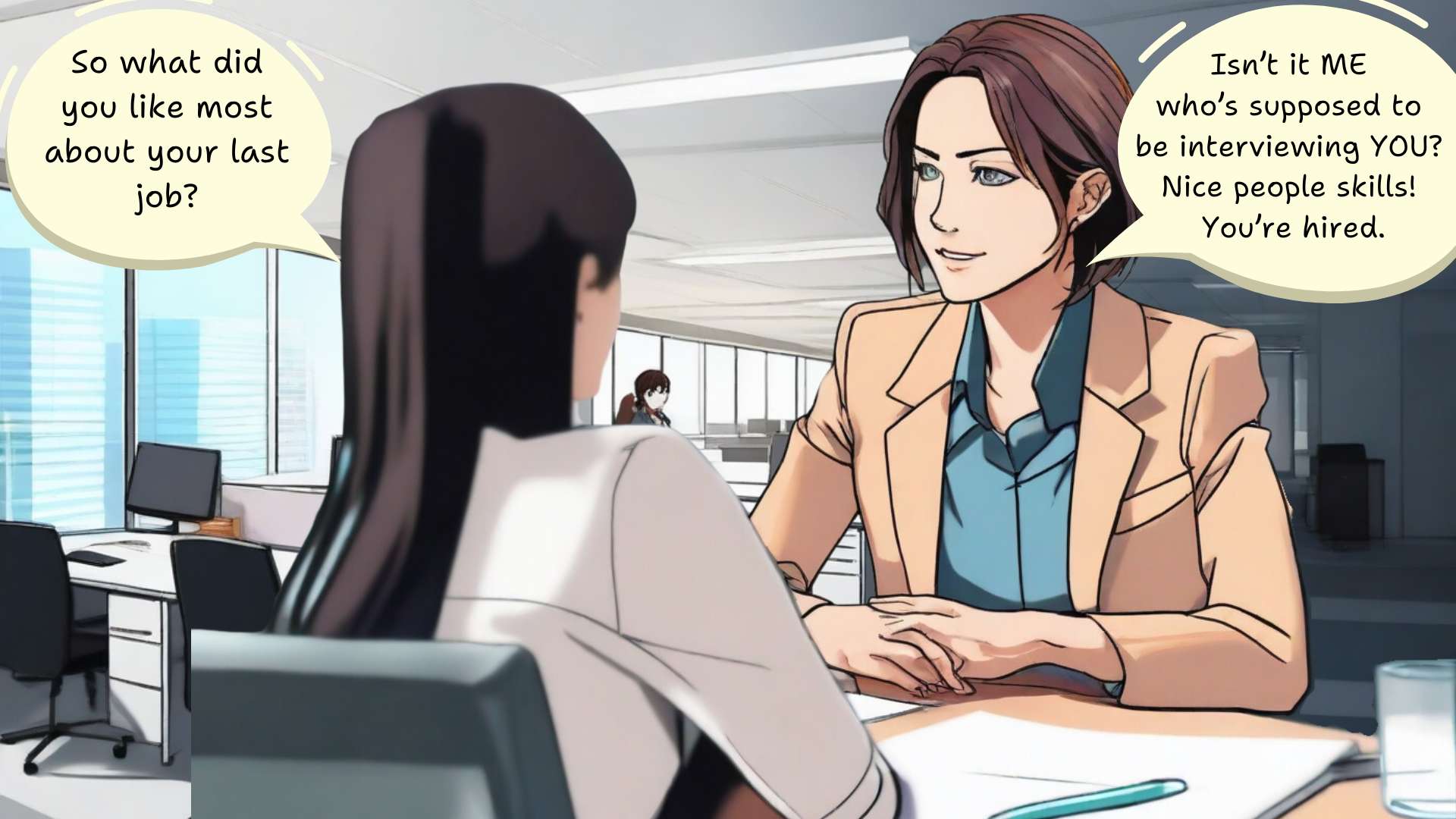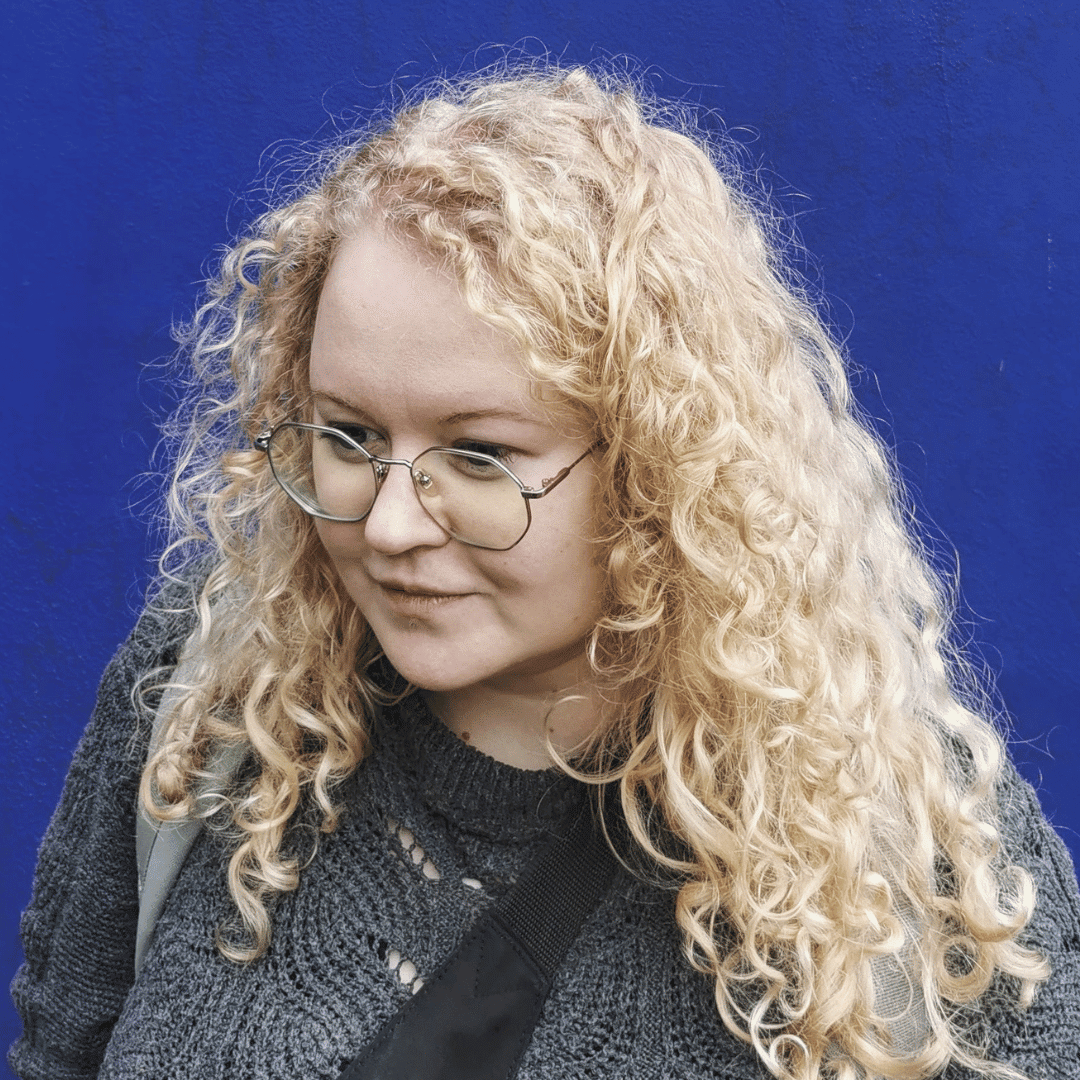Go into politics? Be a doctor? Sell cars? Synthesizing info, listening, asking questions and handling deadlines are valuable skills whatever the job.

One woman interviewing another for a job realizes she is the one being interviewed. (Illustration by News Decoder)
Journalism and activism can be powerful tools for change. Each week in our News Decoder Top Tips, we share advice from reporters, editors, writers and master storytellers on ways to better engage audiences and spur change. In this Top Tip, Sabīne Bērziņa, News Decoder’s user experience manager for its Promoting Media Literacy & Youth Citizen Journalism through Mobile Stories project, explores the skills involved in journalism and shows how useful they can be in other professions and jobs. Top Tips are part of our open access learning resources. You can find more of our learning resources here. And learn how you can incorporate our resources and services into your classroom or educational program or by forming a News Decoder Club in your school.
News Decoder works to teach young people journalistic skills. But those skills can be useful even if you have no intention of ending up in journalism. Researching. Communicating. Interviewing. All three are pillars of what it takes to be a journalist. They are also much needed skills whatever professional path you choose.
Norma Hilton recently made a career transition from journalism to a humanitarian organization writing stories, editing photos and videos. She is also involved in producing documentaries. “I use a lot of my investigative journalism skills to do this work,” she said. In many ways, it feels like she still is a journalist.
As a young investigative reporter published in The Toronto Star, The Mississippi Center for Investigative Reporting and The Special Broadcasting Service in Australia, Hilton is one of the journalism video instructors for Mobile Stories — an innovative journalism education and publishing platform used in schools — and began working with News Decoder through its partnership with the Dalla Lana School of Public Health’s Fellowship in Global Journalism.
At News Decoder we used our experience and know-how to lead the content development for the international version of Mobile Stories in English. It’s a continuation of our work with students in our schools program showing them that they too can take part in globally important conversations through journalism.
However, although journalism is central to News Decoder’s approach to global education, it is not the end goal. “News Decoder is not a journalism school,” said Managing Director Maria Krasinski.
Primarily, News Decoder’s team seeks to build global citizenship. “Journalism opens up a pathway to be curious about the world, to be civically engaged and to tell stories that might not otherwise be told,” Krasinski said. “To publish on News Decoder is to discover that your voice matters, and can reach audiences around the world.”
We decided to ask Hilton and other reporters we work with about the skills that they’ve found most useful and transferable to other career paths.
Juggling deadlines and finding stories
In journalism, a news cycle is fast but quality research is expected nonetheless. “Journalists are good at handling massive workloads and quick deadlines,” Hilton said. “Time management skills like these are essential at any job.”
Hilton thinks that journalists are also trained to consider their audience more. “Being in tune with that aspect of the work is key to delivering a good product, whether that’s a story for a website or developing a new product for a startup,” Hilton said.
Journalists have to be flexible. News Decoder correspondent Susan Ruel found that her experience gave her fluency to write speeches, articles and profiles, awards nominations and scripts for short documentary films when she had to transition to different roles in public relations and academia due to the instability of journalism jobs.
“What I’ve found most helpful in other roles has been my journalistic on-the-job training to write quickly and accurately in a range of long and short forms,” Ruel said.
Krasinski said journalism hones skills like research, reporting, interviewing, active listening and identifying trustworthy sources. Journalism skills come into play outside of a professional life, as well. You need to be able to think critically, analyze information and protect yourself from lies and distortions in everything from online shopping to voting.
However, after working with many people with journalistic backgrounds, there is one ability Krasinski especially wishes she could transfer to everyone.
“Journalists are experts at wading through seas of information to find the heart of the story, and then conveying that story in a clear, concise and compelling way,” she said. “There will always be a need to make dense, dry or overwhelming information accessible and engaging, in any field.”
Listen and learn.
Finding the story in a sea of information came into play for News Decoder’s correspondent Helen Womack. After many years of covering Russia and the Soviet Union as a correspondent for the Reuters global newswire service, Womack wrote for the United Nations Refugee Agency, interviewing refugees and writing their stories.
Journalists are trained to both see the big picture and pin down the relevant details. After that, journalistic writing helps you structure all of it by answering the main questions like who, what, when, where and why in your story.
“Writing helps you think. It helps you to clarify and order your thoughts,” Womack said.
To get there, you also need to learn how to listen. One of the ways journalists learn new things is through interviewing — asking good questions at the right time.
Womack thinks that listening is more important than the list of questions you write down while preparing. To get someone’s story takes patience and the ability to understand how the person is feeling and tune into it.
“Almost all people, even the most traumatized people, want to talk about themselves and they want to tell their story,” Womack said. “They want to be heard. There’s a large degree of being a psychologist in being a journalist.”
Ruel notes that these abilities are helpful in personal life too. When you talk to others, you always need to be able to listen respectfully and press for answers when necessary.
Hilton said that journalism training helped her break out of her shell as an introverted teenager. “The more interviewing I did, the more curious I also became about people and their stories,” she said. “People can be very open about their lives and experiences and it’s a privilege to learn about them.”
Break out of your box.
News Decoder’s Educational News Director Marcy Burstiner had a similar experience. “I was the shyest kid in my class at high school and there were 500 kids in that class,” she said. “But as a journalist I didn’t have to talk about myself. It was about asking people questions and I found I was good at that. Shy people are good listeners so they make good journalists.”
The Mobile Stories project asked journalists to record themselves talking about what they like about journalism and what keeps them motivated to do their jobs. Among answers about wanting to amplify marginalized voices and wanting to help people find reliable information, many said that their main motivator was their curiosity.
Journalism has allowed them to explore topics they’re interested in and to invite people they find fascinating for interviews.
This ability to follow your curiosity and meet interesting people can also be a great opportunity for a young person at the beginning of a career. You can use it as a way to reach out to people you think you might like to work with in the future or learn things from.
Hilton says that the best way to start is to interview a friend or parent. “Then try interviewing people for stories,” Hilton said. “You won’t be good at the start. None of us are. But if you keep trying, you’ll get better for sure.”
Click here to learn more about News Decoder Schools Program. Learn more about the Mobile Stories tool here.
Three questions to consider:
- What is a “transferable skill”?
- How might skills like handling tight deadlines or interviewing people be useful to a doctor or lawyer?
- Think of a profession you would like to enter. What skills do you already have that would be useful?

Sabīne Bērziņa is News Decoder’s user experience manager for its Promoting Media Literacy & Youth Citizen Journalism through Mobile Stories project. She is a media literacy curriculum and tool developer, as well as a journalist with nine years of experience in the media industry. She lives and works in Latvia.

What is a transferable skill?
It’s a skill learned in the past, in a field that currently you are not in. This skill you may apply it in the current days in the current field that your are in.
How might skills like handling tight deadlines or interviewing people be useful to a doctor or lawyer?
For instance, the doctor must extract every piece of information from their clients (patients), in order to know the background of them, and to guess the root of the weakness that is afflicting his/her patient.
Think of a profession you would like to enter. What skills do you already have that would be useful?
I would like to enter into the world of creating books for children. I am currently telling stories to children, where I am honing my skills of storyteller.